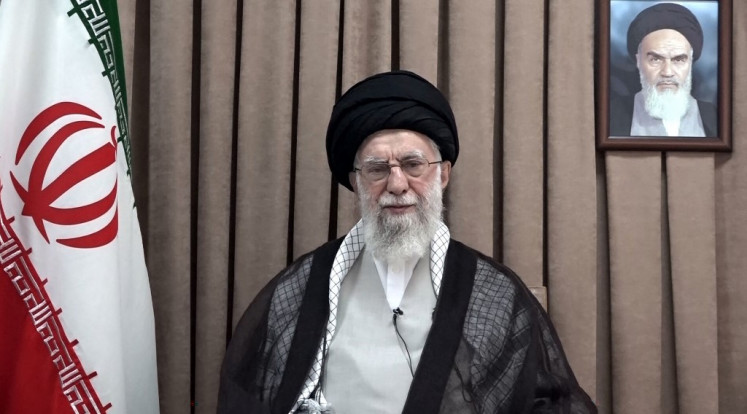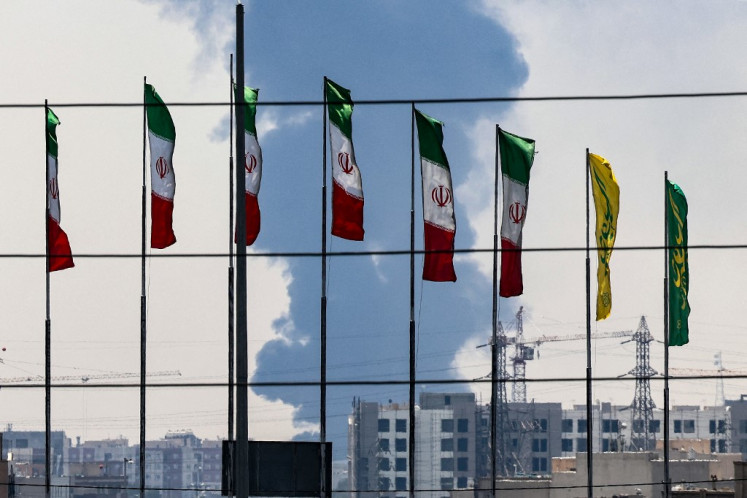Popular Reads
Top Results
Can't find what you're looking for?
View all search resultsPopular Reads
Top Results
Can't find what you're looking for?
View all search resultsJakarta administration aiming to clear all slum housing by 2017
Many things have changed in her neighborhood on Gang Kingkit, Gambir, Central Jakarta, since Nurhasan, 53, left her hometown of Cianjur, West Java, and settled there to start a family about 30 years ago
Change text size
Gift Premium Articles
to Anyone

M
any things have changed in her neighborhood on Gang Kingkit, Gambir, Central Jakarta, since Nurhasan, 53, left her hometown of Cianjur, West Java, and settled there to start a family about 30 years ago.
It was not as crowded as it is now, obviously. Most residents came from various regions in the country and started new lives and families there. Nurhasan and her husband, have a family of eight children and 12 grandchildren.
The narrow alley nestles among office buildings, hotel and apartment towers ' located just across from the Presidential Palace compound ' but the contrast is stark.
Though one or two houses are in decent shape, most of the remaining houses in the neighborhood are tiny and shabby, with some houses sheltering more than one family. The open drains are clogged with household waste trapping sewage unable to flow to a proper sewerage system.
When the rainy season comes and heavy rains fall, 'the area will be flooded, the worst is up to an adult's thigh,' Nurhasan said.
When that happened, she added, sickness began to appear.
'One or two dengue cases usually occur at those times,' she said, adding that she hoped the city administration would do something to improve the conditions.
Improving the standards of low-income residential areas has long been among the stated priorities of the city administration, including that of former governor, President Joko 'Jokowi' Widodo.
During his two-year leadership of the capital Jokowi introduced various housing programs for low-income families including the Kampung Deret (street village) program, in which each assessed house in a slum area was provided with funds for renovation. The city aims to be free of slums by 2017.
The Jakarta Housing and Administrative Buildings Agency has recorded 392 community units across the capital considered to be slum areas. The agency also points out that almost 50 percent of the capital's population of 10 million are classified as low-income or poor.
The city administration initially planned to renovate 70 kampungs in the Kampung Deret program, but housing agency head Yonathan Pasodung said the target was likely to be revised because of several problems.
'The Supreme Audit Agency reminded us that the program can't be applied to houses built on riverbanks or public roads. So we have to review our target areas and revise it. It might not reach 70 kampungs,' Yonathan told The Jakarta Post at City Hall recently.
Aside from the Kampung Deret program, the expansion and construction of low-cost apartments will also be part of the city's program to clear slum areas in the capital.
Governor Basuki 'Ahok' Tjahaja Purnama plans to build 500 low-cost apartment towers next year, to be developed by the city administration, the central government or by private developers.
A gubernatorial decree obliges every private developer who acquires a plot of land of 5,000 square meters or more to allocate 20 percent of the land for affordable housing.
The programs, however, face a number of challenges.
'The availability of land and land acquisition remain our challenges,' Yonathan said, adding that the agency was compiling a list of city property that could be developed into low-cost housing. The city has started rearranging its properties, with a number of buildings expected to be demolished and merged to provide more land for low-cost apartments.
In a district with many slum areas, the city will expand the low-cost apartment building to accommodate more families.
'For example in Tambora [district], we're raising the buildings from four stories to 16 stories,' Yonathan told an urban forum recently.
He emphasized that the programs would not be burdened by financial challenges because 'the city has adequate financial resources'.









